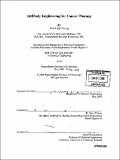| dc.contributor.advisor | K. Dane Wittrup. | en_US |
| dc.contributor.author | Yeung, Yik Andy | en_US |
| dc.contributor.other | Massachusetts Institute of Technology. Dept. of Chemical Engineering. | en_US |
| dc.date.accessioned | 2006-03-29T18:34:21Z | |
| dc.date.available | 2006-03-29T18:34:21Z | |
| dc.date.copyright | 2005 | en_US |
| dc.date.issued | 2005 | en_US |
| dc.identifier.uri | http://hdl.handle.net/1721.1/32325 | |
| dc.description | Thesis (Ph. D.)--Massachusetts Institute of Technology, Dept. of Chemical Engineering, 2005. | en_US |
| dc.description | Vita. | en_US |
| dc.description | Includes bibliographical references (leaves 131-141). | en_US |
| dc.description.abstract | Antibodies targeting various tumor-associated antigens have been developed successfully to treat cancer. In this Thesis, novel antibodies and antibody-conjugate against two tumor antigens, AF-20 antigen and human aspartyl (asparaginyl) [beta]- hydroxylase (HAAH), were developed. Previously, these two tumor antigens have been shown to be present on a variety of tumor cells, while they have minimal expression on normal tissues, rendering them excellent targets for antibody therapy. For the AF-20 work, the variable region (V) gene of a previously isolated mouse monoclonal antibody (mAb) AF-20 was cloned from hybridoma mRNA and used to construct an AF-20 single-chain Fv (scFv). The AF-20 scFv was shown to bind specifically to the same epitope as mAb AF-20 with a binding affinity of 4nM. The AF- 20 scFv was also internalized into tumor cells in a manner identical to that of the original mAb AF-20. The scFv was later employed for cellular internalization of virus-sized fluorescent quantum dots. In addition, to demonstrate the versatility of this antibody, an immunotoxin composed of AF-20 scFv fused to the highly cytotoxic recombinant toxin gelonin was constructed, and its in-vitro efficacy against three different tumor cell lines were evaluated. The IC50 of the AF-20 scFv-gelonin fusion was consistently one to two logs lower than the IC50 of free gelonin on FOCUS (liver), L3.6pl (pancreas) and PC3 (prostate) cells, further demonstrating the capability of the AF-20 scFv as a targeting module. Therefore, this AF-20 scFv is a potential internalization vector for toxins, enzymes, radionuclides and virus for targeted therapy of AF-20-antigen expressing tumor cells. | en_US |
| dc.description.abstract | For the HAAH study, twelve novel human scFv against HAAH were isolated from a human non-immune scFv library displayed on the surface of yeast. Five of the twelve scFv were reformatted as human IgG 1. One of the reformatted IgG, 6-22, showed significant binding to recombinant HAAH protein in ELISA, tumor cell lines, and tumor tissues. 6-22 IgG was also shown to target the catalytic domain of HAAH, and its apparent dissociation constant was determined to be 1.OnM. 6-22 IgG alone does not exhibit significant cytotoxicity toward the tumor cells. However, 6-22 IgG internalizes into tumor cells and can therefore be employed to deliver cytotoxic moieties into tumor cells. A goat anti-human IgG-saporin conjugate was delivered into tumor cells by 6-22 IgG and hence elicited cytotoxicity toward the tumor cells in vitro. Meanwhile, the monovalent affinity of 6-22 scFv was too low for therapeutic or diagnostic application, so 6-22 scFv was affinity matured using directed evolution and yeast surface display. After two rounds of mutagenesis, a mutant, C4-18, with an affinity of 0.6nM was isolated. Overall, these human [gamma]-HAAH scFv and IgG can potentially be used in the diagnosis and therapeutic treatment of HAAH-expressing tumor cells. | en_US |
| dc.description.statementofresponsibility | by Yik Andy Yeung. | en_US |
| dc.format.extent | 144 leaves | en_US |
| dc.format.extent | 8124202 bytes | |
| dc.format.extent | 8131970 bytes | |
| dc.format.mimetype | application/pdf | |
| dc.format.mimetype | application/pdf | |
| dc.language.iso | eng | en_US |
| dc.publisher | Massachusetts Institute of Technology | en_US |
| dc.rights | M.I.T. theses are protected by copyright. They may be viewed from this source for any purpose, but reproduction or distribution in any format is prohibited without written permission. See provided URL for inquiries about permission. | en_US |
| dc.rights.uri | http://dspace.mit.edu/handle/1721.1/7582 | |
| dc.subject | Chemical Engineering. | en_US |
| dc.title | Antibody engineering for cancer therapy | en_US |
| dc.type | Thesis | en_US |
| dc.description.degree | Ph.D. | en_US |
| dc.contributor.department | Massachusetts Institute of Technology. Department of Chemical Engineering | |
| dc.identifier.oclc | 61368509 | en_US |
